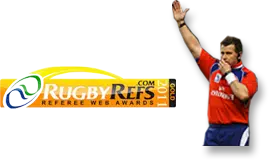Our Roots
The Way We Were
Six men in a bar (where else would they be?) founded the Bristol & District Association of Rugby Referees on 29 October 1893. This small event was part of a major revolution in the game.
1893 was the year when the R.F.U. produced its first real Lawbook. Until then, the Union had assumed that because "everyone playing the game had grown up in the game", nobody needed to be told the rules (as they were then called). In fact, there had been few rules, and each captain was his own referee. This led to disputes between captains, so each team also appointed an umpire, who 'strolled about the touchline' and - while play was stopped - heard both sides of the argument. Umpires usually acted as sixteenth men for their sides, and often they couldn't agree, and so the final scoreline would include a disputed try or goal. Clearly, the system wasn't working. Soon umpires disappeared and a sort of referee appeared in the middle, but he still acted only on appeals from players. No great improvement there, then.
Action
Meanwhile, the game was rapidly spreading. It became faster and more open. A better method of control was urgently needed, and the 1893 Lawbook marked a huge step forward. It put the referee in sole charge of the match. It gave him full powers to control play according to the Laws of the Game. And it abolished the player's right to appeal - something which, even today, a few players believe still exists.
The Association (later the Society) had a shaky start. Most of its members were young enough to be playing, and they were very sensitive about their relationship with the clubs. In 1893 there were 29 clubs in Bristol and at first they did not always admire and respect the referee. The Society had to fight for its status. When one club made a written complaint, saying the referee 'did not give satisfaction to either side', the Hon. Sec. sent them a three-page letter, answering all criticisms, and ending:
...we wish to point out, that the referee is present not to give satisfaction to anyone, but to see that in play the rules are observed and to enforce such observance impartially.
A brave point then, and just as true today.
Another act of courage was the first dismissal, only two weeks after the Society began. Mr Lawes, refereeing Bristol Hornets versus Knowle, warned Mr Dymond of Hornets that if he continued to misconduct himself, he would be sent off. "It would take a better man than you to do it," Mr Dymond replied. He was wrong. Dymond went. He apologised - too late - and got 14 days' suspension.
Onwards
The Society began to feel its strength. Two years later, the Hon. Sec. sent a postcard saying he'd become captain of Oakfield 2nd XV, and would that matter? The meeting decided that yes, it would, reduced him to the ranks, and elected another Hon. Sec. Membership was looking up (29 in 1906), and so was the Society's reputation: it sent referees to Bath, Weston, Gloucester and Cheltenham. As ever, the struggle to maintain and improve standards was neverending. The Society's minute books are a long catalogue of foul play, insults and non-appearances, usually by clubs, occasionally by members.
A common topic at meetings was money. In 1895 a fee was agreed of 2 shillings for a match within 4 miles and 4 shillings within 6 miles. (Bear in mind that you could buy a bottle of 12-year-old Scotch for 4 shillings.) By 1919 the usual rate for more distant matches was double the return railway fare. Since that was far more than actual expenses, some members obviously expected to be paid for their efforts. Collecting fees was a constant headache. In 1925 the Clifton club failed to pay match fees for two months, and they got a letter - no more referees. A cheque and an apology came by return post. Sound familiar?
Breakthrough
The story of the Society since then is one of hard work, rising membership, and the usual odd points of law. (In 1948 a Bishopston player wore glasses in a match. In 1955 a player used his head and nodded the ball forward. In 1957 a kick at goal was taken without a crossbar, which had collapsed. And so on.)
There was no lack of talent amongst members; what was lacking was opportunity. Bristol, in the years before Motorways, InterCity trains, and universal car ownership, suffered in comparison with, say, the London Society.
What's more, all big clubs chose their own referees. Despite these obstacles, after World War Two we broke through the barriers. Ken Golledge took an England Trial; so did Norman Wyatt; they deserved to go higher. And finally, merit was fully recognised. Mike Titcomb joined the International Panel in 1964 and went on to referee every major rugby nation, as did Ed Morrison soon afterwards. Their triumph was a reward for the patience and perseverance of hundreds of the Society's officers, and the efforts of thousands of its referees, throughout the previous decades.
Register for your ELRA course now!
